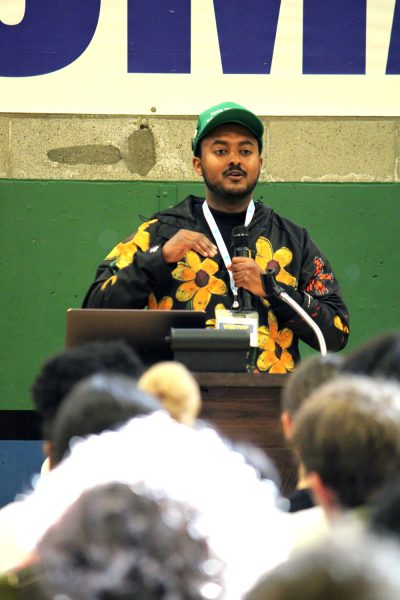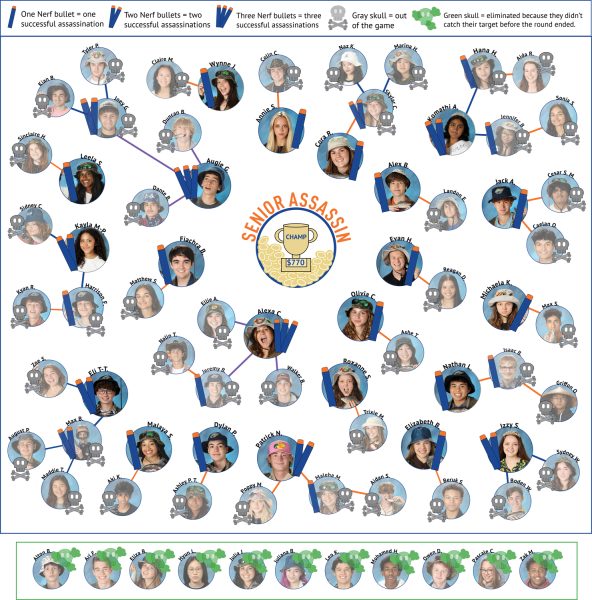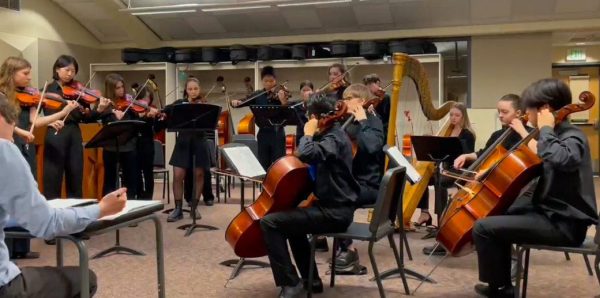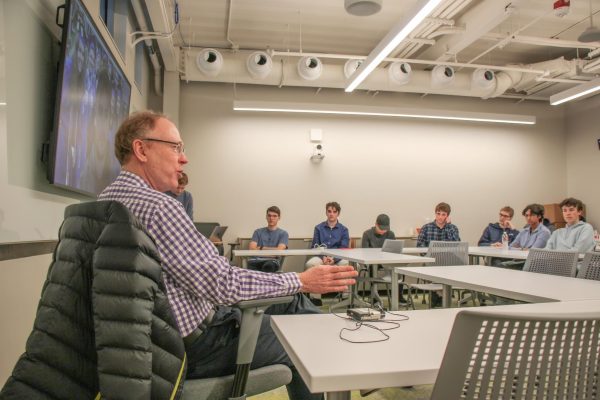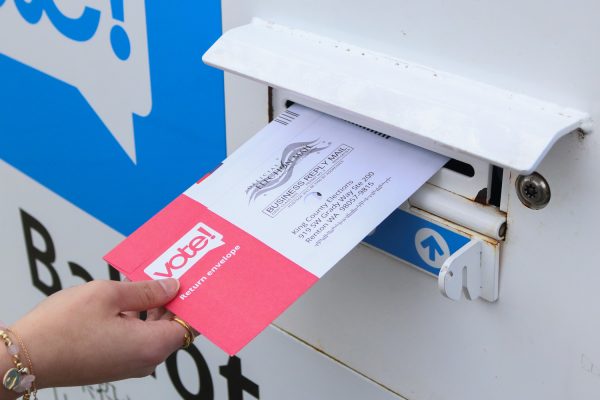Patrick Grant
History Teacher and 11th Grade Dean
Biography:
Western Washington University: BA, Urban and Regional Planning; MS, Historical Geography
- Has earned travel scholarships to Germany and Japan, and traveled to India on a Fulbright scholarship
- Member of the Educational Advisory Group of the San Francisco Federal Reserve Bank
- Received Gilder Lehrman scholarships to study United States History at both Oxford University and Cambridge University in the U.K.
- World Affairs Educator of the Year 2015-2016
- Speaks fluent German and French
Background: Mr. Grant taught me U.S. History and Civics. His enthusiasm for history–and his many interesting life experiences–are evident in his teaching style, and I was excited to learn more about him!
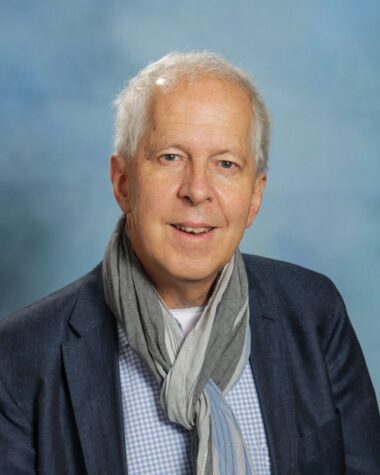
In class, you tell us all these amazing stories from your life. They make it sound like you’ve been all over the place . . . why did you decide to become a teacher?
When I went to college, I wasn’t thinking about becoming a teacher. Then I went to graduate school and traveled to Nepal. I did a big study in Nepal about the environment, and landscape. I traveled for months and took notes about the environment. I looked at land use. I learned Nepali and interviewed people. I asked about their crops and farming methods. I also looked at elevation, what I perceived to be climate zones. I traveled in an area that was a wet climate zone, then walked through the Himalayas to the dry side.
Time stamp on details for environmental stuff: 17:00
As a result of that, I gave some presentations, and people—including some of my classmates and the professor of our group—said to me, “you know, you’re really good at this. You’re clear, you provide organized information. You should become a teacher.”
I had already taught as a TA in graduate school at Western Washington University. But my experiences in Nepal were really what made me think I’d give teaching a try.
When I first started as a teacher I liked teaching a lot—I enjoyed the students I was working with, and I enjoyed the material I was teaching. The problem was, I started in a boarding school in Minnesota. It had been a military academy, and it was not the right fit for me. They had kids in marching groups and so forth . . . I could live with that. But they said, “during your free periods, are you going to make sure the students have made their beds?” I was like, “really? Is that really that important in their lives?”
I applied elsewhere, and University Prep fit more my mission and who I am. Here I still am, 36 years later. I originally thought I might become a university professor. I did teach a class at Western Washington University one summer, but I found it to be not as much fun as high school. It was a huge turning point. I realized I was in the right spot at University Prep.
Why do you enjoy teaching high school over college?
This is my standard response. When you say to a class of 6th graders: “does anyone have any comments about what I just said?” they go: (waves hands wildly). Everyone’s so excited.
Then 7th grade: (waves hand less energetically)
8th grade: (raises hand)
9th grade: (slowly raises hand)
10th grade: (slowly raises hand)
11th grade: (half raises hand)
12th grade: (raises one finger)
College: (nothing).
There’s this famous Doonesbury cartoon that captures that idea. Middle school and high school students are so much more eager to learn and engage than college students. At a school like University Prep, students are going to ask the important questions that need to be asked. There’s going to be a much livelier engagement about whatever we’re talking about. When students raise those questions, teachers are still guiding the conversation, we’re still setting the stage, but the students are actively fueling greater learning. It’s about the interaction between the student and teacher.
Ours is a school that really tries to promote that. You’re probably tired of hearing “intellectual curiosity,” but it sets University Prep apart. Students here are really engaged in what is going on. They ask hard questions and even disagree with teachers. Sometimes students make me reconsider how I see things. Socrates was a big advocate of that. He didn’t write anything down; his philosophy was around the idea of a deep conversation, leading to some “aha” moments.
In college, you should go in during office hours and chat with your professors. They love to talk to students. That will lead to greater learning, in a broad sense—you’ll learn about things you didn’t expect to.
My first year of teaching, a student challenged me to a duel.
— Mr. Grant
Thank you! I find it impressive that you can just reference Socrates out of the blue—you have so much casual historical knowledge. How did you first come to history? Why did you choose to pursue it?
I’ve always loved Geography and History. When I was four, I was putting maps of the United States together in puzzles.
My first year of teaching, a student challenged me to a duel. We had to put together a map puzzle of the United States while blindfolded. Who could do it the fastest? It took me 29 minutes. Do you know how hard it is to figure our what Delaware looks like when you’re just feeling it? It’s really hard! The student didn’t finish. At 45 minutes, he conceded. I won!
So, I did map puzzles. Then I got interested in History. I had relatives and friends who were interested in History. I started reading. I was reading books on my own, and I would come to the teachers and discuss these books with them. Students do that with me now, which I love.
One of my teachers taught me for three years. He loved world history. He also spoke German and was interested in classical music. Those are things I link to him, too. He had a huge impact on me. Then I took a class in high school on US history. I took an elective from a teacher who adored military history. It’s not my thing, but I liked hearing his perspective.
I did my master’s thesis on the history of Ferries in the San Juan Islands. My thesis is still the best resource of information about the evolution of Ferry boats there. It primarily focuses on 1900s-1950. There were private ships servicing on an irregular basis. Then they became regular passenger ships, which came on a schedule. Then there became automobile Ferries. Then the state took over in 1950s. Someday I’m going to publish it. I think people would be interested.
Wow—like I said, it feels like you’ve done a bit of everything!
Oh, no, there are a lot of things I haven’t done.
What other things would you like to do?
I’ve never seen an Opera at the Metropolitan Opera. I stream them on my devices, but I’ve never been there in person.
I’d love the publish my Ferry history. I like to draw maps of imaginary places, so when I retire, I’d like to make an Atlas, or something like that . . . some kind of creative book. I would also like to become a docent at the Seattle Art Museum, which you have to be retired to do. I’ve also thought about volunteering to help immigrants learn US history. If you want to become a US citizen, you must take an exam on US history. I think that would be a way I could help the community.
There are a few places in the world that I’d like to go to. I don’t feel the need to travel to every country in the world—I know someone who wants to do that—but I’d love to see Sweden, Denmark, Norway, Finland. I’d love to see South Korea.
I’ll be honest . . . I had a terrible experience in high school.
— Mr. Grant
We’ve talked a lot about your life as a young adult and your hopes for the future, but what was your life like when you were my age? What was high school like for you?
Well, I’ll be honest with you: I had a terrible experience in high school. I went to a large public high school, and I was bullied pretty badly. People threw spit wads at me in class and the teacher didn’t do anything about it. People called me homophobic slurs, and teacher didn’t do anything about that. It was an environment where people would say, “chin up and face it.” That kind of attitude.
I couldn’t learn easily. Most of the bullying happened in math class, and as a result I didn’t do well in math. You can’t think about factoring equations when people are yelling theses slurs at you. You’re going to go home and feel bad about yourself.
So high school was miserable for me. But I learned how not to teach, and I also got a sense of compassion towards students that stays with me to this day. I remember what it’s like to go through rough times alone. That has been a great benefit for me, as a high school teacher.
How has your perspective on high school changed now that you’re a teacher?
I remember saying at one point, “I’m never going to be a high school teacher.” But here I am, and I’m happy to be here.
I don’t know that I would ever have gone back to teach at my high school. I’m teaching at a private school now, which is a bit different. That said, I’ve visited a lot of public schools that are very much like University Prep. They’re a bit smaller and have an intention of being inclusive. It may be about size, but it’s also about leadership—what kind of leadership has gotten into place.
How have methods of teaching changed since you were in high school? How has your teaching style changed over the course of your career?
When I started teaching, a class would be: “alright, here’s the information for today. Point 1. Listen carefully. If you have any questions, let me know. Point 2. Listen carefully” and so on.
You’d stand up and write on the chalkboard, so students could see; that was the new innovation. There was none of this stuff about individual learning plans or extended time. The Americans with Disabilities Act had not been adopted yet. There were informal accommodations from time to time if kids were really struggling, but nothing formal.
Gradually, we began to move towards the idea of cooperation and group projects. By 1995-2000, we were using this model with technology. I got a grant from the Gates foundation to learn about using technology—Windows, obviously—to facilitate learning in the classroom. This grant included a laptop for me as a teacher, and one computer for every four students in the classroom. I did a ton of group projects involving computers. I even taught for the Gates Foundation. I taught other teachers how to use technology in the classroom. This was in 2001 and 2002.
Eventually, students grew tired of sharing computers. The technology got better and cheaper, so every student could have their own laptop. Then collaboration through Google Drive became the big thing.
This has all come relatively rapidly–it’s kind of like this years’ schedules.
— Mr. Grant
This has all come relatively rapidly–it’s kind of like this years’ schedules. We have all these different schedules, and we need to create and learn them at the last minute. Same thing with technology. We never got trained in Google Drive—I’ve never had any training, in Google Drive, ever. Never! I learned everything by saying, “I guess I’ll click this button and see what happens.” If I sit down for an hour, I can learn to do any application. That’s how I learned Microsoft Word, Excel, and so on.
We’re now in a phase where social emotional learning is really big. It’s not about content, but about helping the students. Inclusivity is really big. We want to make sure that everyone feels like they are a valuable person in this world. If someone has been hurt and beaten down, we need to reach out and pick that person up. If there’s something systemic in our society that’s causing them to be hit badly, we need to figure that out. That’s why I decided to include Just Mercy and the voices of First Peoples in our curriculum for Civics.
I wish we had that kind of emotional support in 1975, when I was a senior in high school! In those days, if you were an outcast, you were roadkill. Splat. Goodbye. I’m thankful that we’re at this stage. I fully support this.
What will the new thing be in 5 years or 10 years? I don’t know. But it will be different.
I hope they get rid of grades. I hated grades all throughout high school. One of my colleagues calls them “a toxic poison.” She’s right. When you’re 40 and teachers no longer give grades, you’ll look back and think, “Pat Grant said this was going to happen.” Remember me!
My middle school—Seattle Girls’ School—didn’t have grades, and it worked fine for me.
You went to Seattle Girls’ School? Did you have Wendy Ewbank?
Yes, I did! Do you know her?
Oh, yes! Wendy was president of the Washington State Council on Social Studies about 10 years ago. She and I both won the “World Educator” award from the World Affairs Council. I was World Educator in 2015. She’s just a great person!
Can you tell me more about your work on the Council on Social Studies?
I’ve been very involved! Before COVID, I went to conferences all the time—I’ve probably given 15 presentations at different conferences. I gave a presentation on my Hamilton project at the last conference I went to, two or three years ago.
I created the Hamilton project with Dave Marshall. For the project, students analyze a selection of some of the more historical songs from the musical Hamilton. What is the song saying about history? Is it historically accurate? Why or why not? I do it all the time in the Topics Art and Music class.
When I talked about this project at the conference, I was asked to give a short synopsis of what I was going to say. I decided to say something in the style of Hamilton. I got up and said:
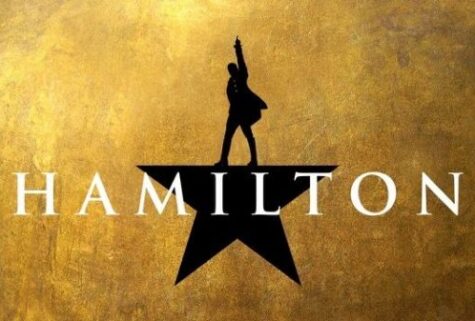
“Hamilton! The musical sensation!
Has captured the imagination
Of the next generation!
Come gain some inspiration!
To teach this magical creation!
At my presentation!”
And my talk had a great turnout!
What do you want students to get out of your class?
I hope that they’re excited to learn more.
That’s certainly been my life. History is about an ongoing learning. I have masses of books of history that I’m still reading. It gets more exciting as you go. The stories you’ve heard in my class—some of those that weren’t around 10 years ago, because I hadn’t read them yet. I’ll be adding more next year.
History is about an ongoing learning
— Mr. Grant



